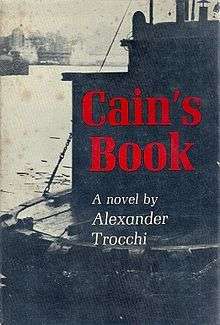Cain's Book
Cain's Book is a 1960 novel by Scottish beat writer Alexander Trocchi. A roman à clef, it details the life of Joe Necchi, a heroin addict and writer, who is living and working on a scow on the Hudson River in New York.

The book alternates between Necchi/Trocchi's attempts to score and flashbacks to his experiences as a child in Glasgow, and later as a young man in London and Paris. It is also an account of what it means to be a junky and an outsider from society. On occasion it can descend into ranting about the hypocrisy and stupidity of drug prohibition and the general inequities of the world. It describes with an eye for detail the rituals of heroin, the cooking up and the search for a suitable vein.
It gets more and more fragmented as it draws to a close with Trocchi realizing that he is incapable of a maintaining a conventional narrative. In being consumed with his addiction, Trocchi strives to document his alienation and his desire to use his creativity against the existentialist fear of being washed away by history with no sign of his life remaining.
When I write I have trouble with my tenses. Where I was tomorrow is where I am today, where I would be yesterday. I have a horror of committing fraud. It is all very difficult, the past even more than the future, for the latter is at least probable, calculable, while the former is beyond the range of experiment. The past is always a lie clung to by an odour of ancestors.
The title of the book gives a clear indication of Trocchi's intentions. He casts himself as beyond society, above laws and morals and wars and guilt. He did not see himself as just a junky but rather a crusader, the mind-expanding quality of drugs, as he saw it, outweighed any other argument against them. But as Trocchi's later life was to show, his own addiction prevented him from finishing any other book-length project.[1]
In 1963 in the UK, Cain's Book was one of many books and magazines seized by the police at a bookseller's shop in Sheffield. Its publisher, John Calder, sought a separate trial for Cain's Book distinguishing it from the hundreds of others that had been confiscated, intending to prevail on the book's literary merit as Penguin Books had done four years before in the trial of Lady Chatterley's Lover. Cain's Book had been published without restriction in the US and France. In April 1964 the UK edition went to trial for obscenity, with six defense witnesses, including author Kenneth Allsop, testifying to its literary value. Three magistrates found against Calder. The case is notable in that the court's judgement was the first in the UK to condemn a book for obscenity not for sexual content but for "the lifestyle it advocated."[2] Alistair McCleery wrote, "The case gave a new lease of life to the use of obscenity charges against literary works where it could be argued that illegal behavior or behavior detrimental to social norms was being promoted."[3] In response to the unfavorable verdict Trocchi held a public burning of his book, with fireworks.[4][2]
References
- Ulin, David L. (2010). The Lost Art of Reading: Why Books Matter in a Distracted Time. Sasquatch. pp. 22–23. ISBN 9781570616709. Retrieved 15 July 2013.
- Sova, Dawn B. (14 May 2014). Literature Suppressed on Social Grounds. Infobase Publishing. pp. 70–72. ISBN 978-0-8160-7150-0. Retrieved 20 October 2017.
- McCleery, Alistair (1 September 2013). "Late News From the Provinces: The Trial of Cain's Book". In Bell, Eleanor; Gunn, Linda (eds.). The Scottish Sixties: Reading, Rebellion, Revolution. Rodopi. pp. 135–151. ISBN 978-94-012-0980-9. Retrieved 20 October 2017.
- Green, Jonathon; Karolides, Nicholas J. (2009). "Cain's Book". Encyclopedia of Censorship. Infobase. pp. 84–85. ISBN 9781438110011. Retrieved 15 July 2013.